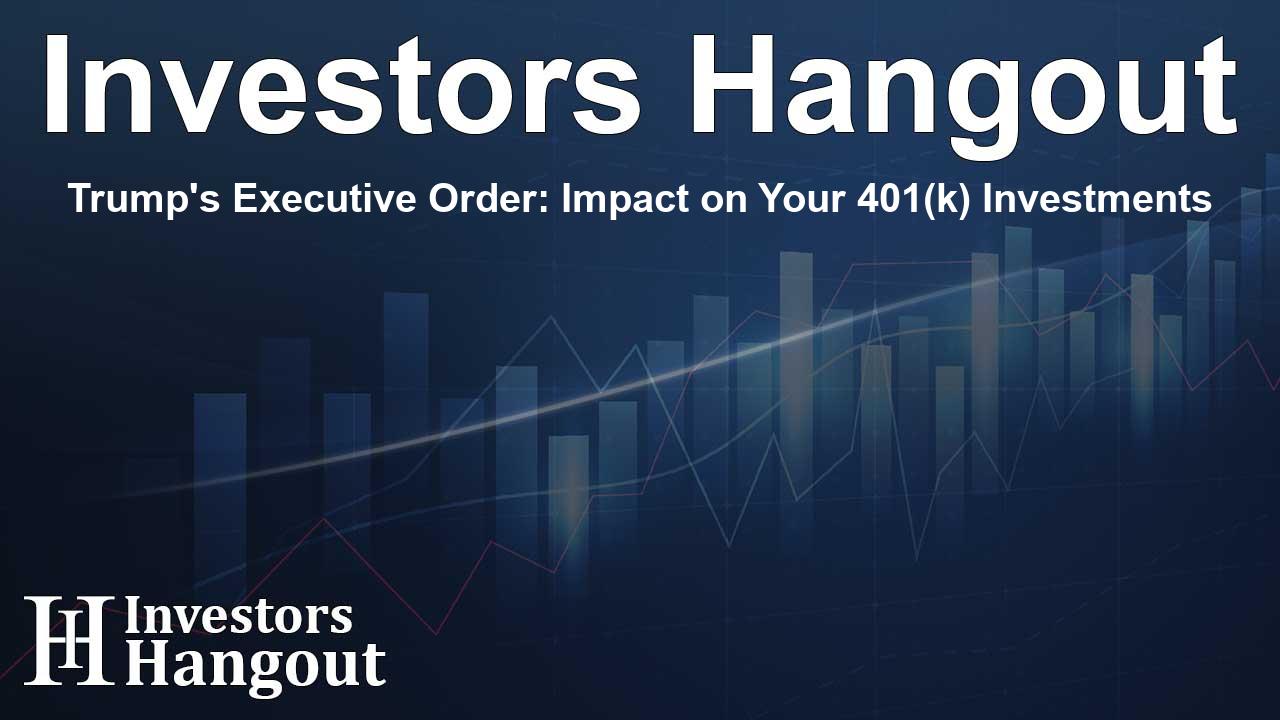Trump's Executive Order: Impact on Your 401(k) Investments

Understanding Trump's Executive Order on 401(k) Plans
President Donald Trump has recently signed an executive order that significantly alters the landscape for 401(k) retirement plans. This change allows for the inclusion of private equity investments within these retirement accounts, raising concerns among financial experts.
The Shift Towards Alternative Investments
The executive order aims to make it easier for alternative investments, such as private equity, to become part of 401(k) accounts. Many industry professionals are apprehensive, advocating for simplified and lower-risk options in retirement savings.
The Risks of Private Equity in Retirement Funds
Private equity investments differ from traditional stocks and bonds. These investments often focus on a limited number of companies, making them less liquid. Investors may find it challenging to assess the daily valuations of these assets due to their unique nature.
Expert Opinions on the Matter
Jeffrey Hooke, a professor at Johns Hopkins Carey Business School, has expressed concerns about the implications of this order. Hooke states, "Private equity often receives favorable treatment in Congress, yet introducing it into retirement plans could be detrimental. Its illiquidity and high fees pose significant risks for investors."
The Lobbying Influence of Private Equity Firms
Private equity firms, recognizing the value of the $12 trillion 401(k) market, have been actively lobbying the Trump administration. Their goal is to gain greater access to retirement accounts, viewing this move as an opportunity to unlock new liquidity.
Alternative Investment Strategies
According to Brian Payne, chief private markets and alternatives strategist at BCA Research, this shift serves as an exit ramp for private equity under current market conditions. While the allure of higher returns is enticing, investors must be cautious of the implications.
Long-Term Effects on Retirement Savings
Despite the promise of potential returns, private equity investments often come with exorbitant management fees. Such costs can impact long-term liquidity, resulting in suboptimal performance for retirement plans. As Hooke warned, this may lead to a decline in overall returns.
Why This Decision Matters to Americans
The inclusion of private equity in 401(k) plans has broader implications that could affect millions. This change might expose American workers to higher-risk investments that can undermine the stability of their retirement savings.
Challenges and Considerations
High fees and limited liquidity associated with private equity could potentially jeopardize the reliability of retirement plans. Many workers could face reduced returns, which could adversely affect their financial security in retirement.
Conclusion: The Future of Your 401(k)
As this executive order unfolds, employees and employers must remain vigilant. Understanding the risks associated with private equity investments is crucial for ensuring that retirement savings are protected and continue to grow over time.
Frequently Asked Questions
What is the significance of Trump's executive order regarding 401(k) plans?
This order permits the inclusion of private equity investments in 401(k) plans, a shift that raises concerns about increased risk for participants.
What risks are associated with private equity investments in retirement accounts?
Private equity investments can be illiquid, less transparent, and carry high management fees, all of which may impact long-term returns.
Why do experts oppose private equity in retirement plans?
Experts argue that private equity can undermine the simple, low-risk nature of 401(k) plans, potentially jeopardizing the retirement savings of many Americans.
How does this change affect everyday Americans?
This shift could expose millions of Americans to higher-risk investments, potentially lowering the reliability of their retirement savings.
What should employees consider regarding their 401(k) plans?
Employees must remain informed about their investment options and consider the risks associated with private equity before making decisions about their retirement plans.
About The Author
Contact Evelyn Baker privately here. Or send an email with ATTN: Evelyn Baker as the subject to contact@investorshangout.com.
About Investors Hangout
Investors Hangout is a leading online stock forum for financial discussion and learning, offering a wide range of free tools and resources. It draws in traders of all levels, who exchange market knowledge, investigate trading tactics, and keep an eye on industry developments in real time. Featuring financial articles, stock message boards, quotes, charts, company profiles, and live news updates. Through cooperative learning and a wealth of informational resources, it helps users from novices creating their first portfolios to experts honing their techniques. Join Investors Hangout today: https://investorshangout.com/
The content of this article is based on factual, publicly available information and does not represent legal, financial, or investment advice. Investors Hangout does not offer financial advice, and the author is not a licensed financial advisor. Consult a qualified advisor before making any financial or investment decisions based on this article. This article should not be considered advice to purchase, sell, or hold any securities or other investments. If any of the material provided here is inaccurate, please contact us for corrections.
